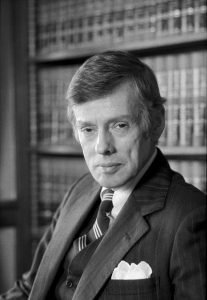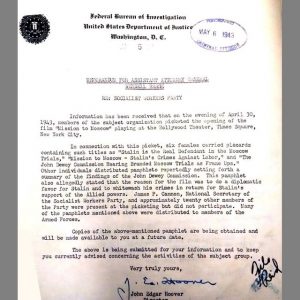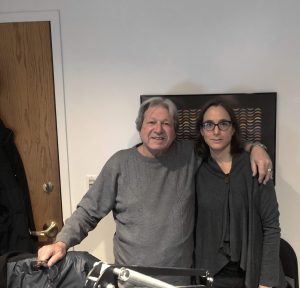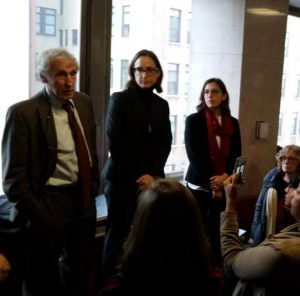Podcast: Play in new window | Download
Judge Thomas Griesa : Socialist Workers Party v Attorney General
Retired federal Judge Thomas Griesa died two weeks ago in New York City at age 87. He presided over the historic case Socialist Workers party vs Attorney General. Leonard Boudin, the great leftist constitutional lawyer of his time, was chief counsel for the SWP in the 15 year litigation which ended in an historic victory in 1986 and which is extremely relevant for today.
Leonard wrote that “This lawsuit represented the first wholesale attack upon the entire hierarchy of so-called intelligence agencies that had attempted to infiltrate and destroy a lawful political party.” Further, “for the first time, a court has thoroughly examined the FBI’s intrusions into the political system of our nation and, in unmistakable language, has condemned the FBI activity as patently unconstitutional and without statutory or regulatory authority. The decision stands as a vindication of the first and fourth amendment rights that only of the Socialist Workers Party but of all political organizations in activists in this country to be free of government spying and and harassment.”
The Nation magazine appreciated the significance of the litigation and wrote that “ for the first time the FBI’s disruptions, surreptitious entries and use of informers have been found unconstitutional. All in all, it amounted to a domestic contra operation against a lawful and peaceful political organization, for no reason other than it’s ideological orientation.“
Guest – Jeff Mackler, a longtime socialist activist in California and the West Coast head of The Committee to Free Mumia Abu-Jamal. Jeff Mackler was a plaintiff in the successful 15-year-old battle. Jeff is also the director of The Mobilization to Free Mumia Abu-Jamal in Northern California and also the National Secretary of Socialist Action and its candidate for the U.S., presidency in 2016.
—-
Awad, et al. v. Fordham University
Israel’s enablers in the United States ramped up their efforts to shut down the growing Boycott, Divestment, and Sanctions movement known as BDS. Many states including New York have passed laws against businesses who would boycott Israel as a way of protesting Israel’s colonization of the Palestinian people. An anti-boycott bill is currently before the United States Congress.
In New York City, Fordham University is attempting to prevent Students for Justice in Palestine, a group that supports the boycott, from forming a campus group. The students brought a lawsuit seeking an injunction against the university to enable them to establish a SJP chapter there. Keith Eldridge, the Dean at Fordham University took the position that a SJP group would create polarization on campus and run contrary to the mission and values embraced at the university located in the Bronx.
The students got help from the Center for Constitutional Rights and Palestine Legal. A suit was brought on their behalf in April of last year. Two weeks ago a hearing was held in Civil Court in New York where the students demanded an injunction against Fordham University to permit them to form a chapter.
Guest – Maria LaHood, one of the student’s attorneys and Deputy Legal Director at the Center for Constitutional Rights with expertise in constitutional rights and international human rights. She works to defend the constitutional rights of Palestinian human rights advocates in the United States in cases such as Davis v. Cox, defending Olympia Food Co-op board members for boycotting Israeli goods; Salaita v. Kennedy,representing Steven Salaita, who was terminated from a tenured position for tweets critical of Israel; and CCR v. DOD, seeking U.S. government records under the Freedom of Information Act (FOIA) regarding Israel’s 2010 attack on the flotilla to Gaza. She works closely with Palestine Legal to support students and others whose speech is being suppressed for their Palestine advocacy around the country. She also works on the Right to Heal initiative with Iraqi civil society and Iraq Veterans seeking accountability for the lasting health effects of the Iraq war.
——————



